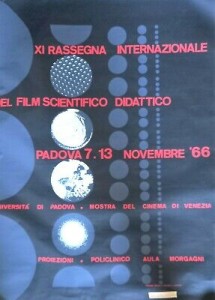Visualising Science on Screen: The Role of Science Film Festivals in Shaping the Relationship among Expertise, Spectatorship and Technoscience. The Case-study of the Rassegna Internazionale del Film Scientifico-Didattico (International Exhibition of Scientific and Educational Film, University of Padua and Venice Film Festival, 1956-1975, Italy)
This archive-based research project investigates how science film festivals are privileged sites for studying the relationship between science, film, expertise and the public(s) across the twentieth century. The period under scrutiny is, more specifically, from the mid-1950s to the late 1970s, a time when television was increasingly, first, accompanying, and, then, replacing cinema in its educational function. In this period film was transitioning from one function to another with an overlapping between the two: from being a technique for visualising the unseen almost entirely controlled by and subordinated to scientists’ needs, to being a tool to produce knowledge but in the hands of other experts (non-scientists and the lay public). The project takes science film festivals as key sites of intermediality – on equal foot with science museums – in the communication and public engagement with science. The project sits at the crossroad of cinema, visual and material culture, science communication, media archeology, and history of science, with a digital humanities component.
Scholarly literature on the relationship between cinema, medicine and science beyond fiction abounds with a focus, more specifically, on early cinema analysed using a historiographical approach; no sustained focus and critical attention, however, has been paid to the evolving role played by science film festivals in reconfiguring both expertise and spectatorship, in contributing to turn science into a public phenomenon and in shaping the dialogue between science, medicine, and old/new media technologies/representational techniques.
The specific form of the science film festival is worth exploring as it enables to study further the dialogues and frictions between scientific expertise, moving images and the targeted audience.
The Rassegna Internazionale del film scientifico-didattico (International Exhibition of Scientific and Educational Film) represents a fruitful case study so far almost neglected by scholarly literature with the exception of a doctoral dissertation written in Italian (Buzzo 2013) and of a brief mention in a journal article (Canadelli and Casonato 2019). The Rassegna, which was conceived by the University of Padua in collaboration with the Venice International Film Festival (hence VFF), ran for almost twenty editions between 1956 and 1975. The festival saw the participation of countries across the world (the former Soviet Union, the former DDR, US, Brazil, former Czechoslovakia, France, UK, Italy, Poland and Hungary are the most frequent nations) and awards were given to films in different sections based on discipline-specificity and/or on purposes (research, didactic, divulgation).
